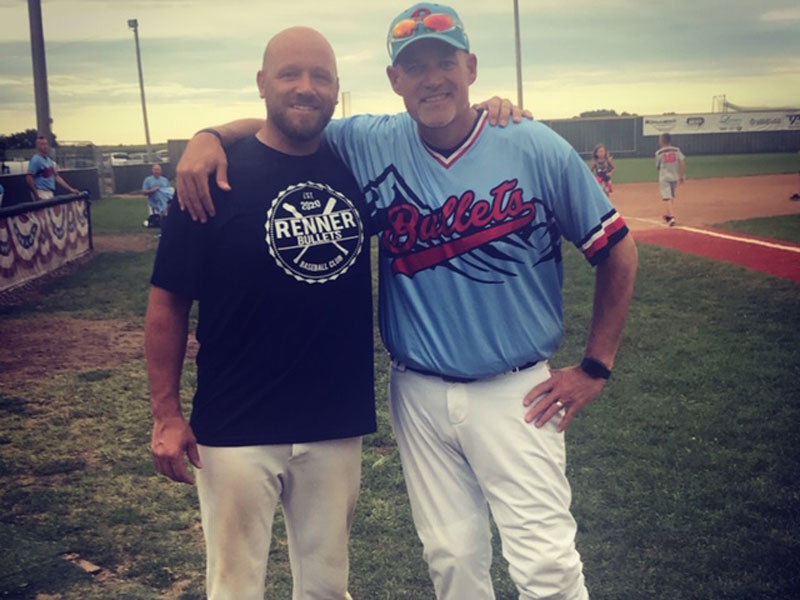On July 10, 52-year-old Billy McMacken took the walk from the dugout to the batter’s box, just as he had thousands of times since he was a kid.
As a South Dakota Amateur Baseball Hall of Fame member, he’d first posted terrific numbers as a hitter and pitcher in high school in Brookings, South Dakota, then as a South Dakota State All-American. Decades as one of the best amateur players in the state followed.
A trip to home plate with bat in hand, then, should not have been particularly remarkable for someone who had spent summers throughout his teens, 20s, 30s and 40s playing at least a couple baseball games a week.
But for McMacken, because he was now a cancer survivor, it was a big deal. Maybe one of his biggest deals ever.
“As I walked up to the plate, it was super emotional,” McMacken said. “I was close to tearing up. It’s a long walk from the dugout to home plate in Dell Rapids and I think I relived the whole year on the way up there.”
A year of treatment
It would be easy to say it completed a circle for McMacken, a married father of three — wife Carley, son Thomas (24), Camden (7) and Kendall (5) — who serves as publisher of the Brookings Register, the community’s daily newspaper.
But “circle” isn’t quite the right word. It implies he had returned to the same place.

Photo courtesy of Billy McMacken
A year that included radiation, chemotherapy and surgery for stage 3 colorectal cancer was never going to be a life experience that puts you back in the same exact spot a year later.
“I thought about my wife and my kids and God on my way to the plate,” McMacken said. “The day I got diagnosed I bought a cross that has ‘Philippians 4:13’ on it. It says, ‘I can do all things through Christ who strengthens me.’ I grabbed that cross when I stepped in the batter’s box.”
He ended up walking with bases loaded. It was not the grand slam he was hoping for. Still not a bad day, though.
“I’ve had a lot of really cool moments in my baseball life,” he said. ”And that game, that at-bat, it ranks right up there with all of them.”
My Chart provides reminder
It all started with a physical at Sanford Health Brookings Clinic in early June of 2019. During this appointment the physician said that it was time to start thinking about getting a colonoscopy. McMacken nodded at the suggestion. By his own admission, this nod signaled he was well on his way to putting it off indefinitely.
But when he returned to his office, he realized he’d forgotten to pick up the medicine he was taking for heartburn. He logged into his My Chart with Sanford and sent out a message that he needed a refill on his prescription.
His My Chart also had a message for him:
“There across the top of my chart I saw in red letters OVERDUE COLONOSCOPY SINCE 4/3/2018,” McMacken would later write in a column in his newspaper.
Related: Men’s health: Gearing up for a healthier tomorrow
Up to that point, McMacken was a healthy guy whose most recent experiences with the world of medicine had amounted to getting an annual flu shot. On this occasion, however, he went ahead and scheduled the procedure. He was reminded via his My Chart that this task wasn’t going to leave his to-do list otherwise.
He now says needing a refill on heartburn medication played a significant role in saving his life.
“I’m going to call it divine intervention,” he said. “There’s no part of me that would normally schedule a health procedure. I’m a healthy guy, right?”
Colonoscopy reveals cancer
He sure felt healthy. The colonoscopy, which he had done in Sioux Falls, revealed otherwise.
“When it was over, Dr. (Dennis) Glatt sat down with my wife and I and was very frank with us, which we really appreciated,” McMacken said. “He told us he found a lesion and it didn’t look good. They would send it to pathology and would confirm whether it was cancerous or not.”
That was a Thursday. That weekend he and his wife Carley, who is going into the Augustana Athletics Hall of Fame this September for her golfing exploits, went to the Twin Cities to watch a PGA tour event.
On Monday, he heard that he did indeed have cancer. There would be more tests to determine a specific plan of attack.
He realized, with Carley offering constant support, that he was going to have to trust his Sanford Health providers. There would be many who would play a role in his ultimate recovery.
“After talking with Dr. (Jonathan) Bleeker I was totally confident,” McMacken said. “He told me I had some factors working for me. At age 51, I was young to be having colon cancer — it’s nice to be considered young once in a while when you’re 51 — and that would help me in my fight.”
McMacken’s treatments begin
Chemotherapy infusions were every other Tuesday. He had eight infusions in all, then took a three-week break. He followed with radiation treatments — 28 treatments in 28 days — with Dr. Steve McGraw. Though there were no breaks in the treatment, it was far less uncomfortable than the chemotherapy infusions.
With his strength returning and the cancer shrinking encouragingly, he had surgery on March 5, performed by Dr. Glatt and Dr. Matt Tschetter.
Because he was having issues with blood clots after chemotherapy, the first person to see him on surgery day was a vascular surgeon who implanted an inferior vena cava filter — since removed — to prevent a clot from going to his lungs. His wife’s cousin, Stephanie Munich, is a nurse at Sanford who was there squeezing his hand as the anesthesia kicked in. It was the last thing he remembers.
“The specific surgery performed on me is called an abdominal perineal resection and is one doozy of a surgery,” McMacken wrote in a later column for the Register that re-traced his year with the disease. “I spent six days in the hospital and it left me with a permanent ostomy bag, which I view as a badge of honor.”
Those six days in the hospital post-surgery eventually gave way to a return home with his wife and children, but in the meantime he spent time every day working with the Sanford Wound Care Team.
Leaving the hospital
“Having a permanent stoma and an ostomy bag is life-changing,” he said. “But they worked with me every day I was in the hospital teaching me best practices when it came to changing the ostomy. When I left, they made sure I knew they were only a phone call away to help me with anything I needed.”
He left the hospital on March 11. He did indeed call the wound care team several times. Their attention included personal visits to his home.
About the same time he left the hospital, the coronavirus began shutting down every sports event on earth. This meant he would not be watching the NCAA basketball tournament during his convalescence. More importantly, his weakened state made him particularly vulnerable to severe illness if he were to come in contact with COVID-19.
His orders from his providers were clear: Keep your circle of people you interact with small, stay at home and heal up.
McMacken’s long walk
Four days after coming home he told his wife he was going to take a walk around the block. It was time to get a little exercise, he thought.
“It was one of the most agonizing physical tasks I’ve ever taken on in my life,” McMacken said. “I stopped and rested five or six times just to catch up with my breathing and wait until my legs didn’t feel so rubbery. I was bound and determined to complete it, though. It must have taken me about 30 minutes.”
This humbling beginning to a new commitment to fitness did not sway him. He’s now up to a minimum of 10,000 steps a day with bicycle rides several times a week. He’s changed his diet — he’s become very fond of Sanford Profile protein shakes — and was down 50 pounds by July 20.
Back to work and baseball
With clearance from Dr. Bleeker, he was back at work by mid-May. It was about the same time McMacken told the Renner Bullets, a 38-and-over amateur team that had extended an open invitation spot on the roster since February, that he wanted a little more baseball in his life.
As McMacken put it: “I decided a little baseball would be good for my soul.”
The guy going to the plate was no longer a 51-year-old who was putting off scheduling a colonoscopy. No, this was the 52-year-old McMacken — he walked twice, grounded out and lined out in his four at-bats that day — who wanted to tell every person in the world over the age of 50 to get a colonoscopy.
“I was stage 3 and I didn’t think I had anything wrong with me,” McMacken said. “Who knows how long it would have been before I actually found out otherwise? Stage 4 means it would have jumped to a nearby organ or a distant organ like my brain. Then the survival rate gets much tougher. I want to take my experiences that I had and pass them on and do some good for other people.”
Goodness everywhere
McMacken will tell you he had no idea how many good people are out there, including many cancer survivors, who wanted to support and encourage him. Now he wants to be part of that team.
After he wrote his first column dealing about his health battles, an 85-year-old came into his office at the newspaper. The man told McMacken he had colon cancer when he was 55 and had spent the last 30 years loving life. There was another woman who had defeated cancer and texted him regularly, telling him he could do the same.
Learn more: Cancer survivorship support at Sanford Health
There have been countless other examples. The community of Brookings, where he’s lived his whole life, has his back in a hundred different ways. He also recently learned the South Dakota State Amateur Baseball Tournament will be honoring him with its “Mark Mehlhaf Comeback Player of the Year” award.
“Apparently on-field success has little to do with the award,” McMacken said, laughing. “I’m entering postseason play 0-for-4 for the season with four walks.”
Through it all, there was within Sanford Health a network of professionals who seemed to understand what he was up against.
“Thankfully, I had not needed a lot of medical care in my life up to that point,” he said. “I’ve had some knee scopes as my body began to fall apart from a baseball standpoint, but I had no idea otherwise. I look back on it now and I realize that every doctor, every nurse, every receptionist — every person I dealt with at Sanford, really — was so friendly and caring. I don’t think I could have made it through this without people who cared so much.”
Read more
- High schooler helps others after bout with lymphoma
- Grant gives Sanford access to national cancer trials
- Mom and daughter learn colonoscopy is key to stopping cancer
…
Posted In Brookings, Cancer, Cancer Screenings, Cancer Treatments, Sioux Falls, Specialty Care
